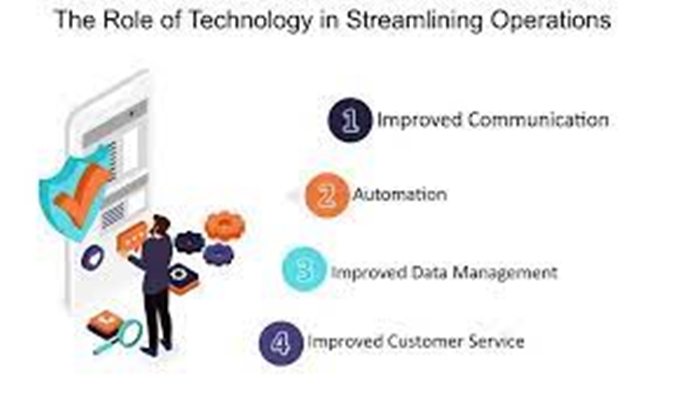In this article, we discussed the role of streamlining business operations, meaning of streamlining, business operations,
Definitions
AI in Streamlining business Operational Processes By examining massive datasets, AI can predict supply chain disturbances, optimize directions for logistics, and manage record more efficiently, reducing costs and improving delivery times. Through AI-driven analytics, businesses can predict record needs with greater correctness.
Streamlining processes refers to the practice of identifying and removing repetitive and unnecessary steps or activities in a process in order to make it more efficient and effective. The goal of streamlining processes is to reduce waste, improve efficiency, and increase productivity. It is also to shape something so that it can move as efficiently and quickly as possible through a liquid or gas: Streamlining cars increases their fuel efficiency. The bodies of dolphins are more streamlined than those of porpoises.
Business operations are all activities that a company performs to grow in value and make more money. This includes production processes as well as managing finances and resources. Business operations are the actions that companies carry out daily to grow the firm’s value and increase profits.
AI in Streamlining business Operational Processes By examining massive datasets, AI can predict supply chain disturbances, optimize directions for logistics, and manage record more efficiently, reducing costs and improving delivery times. Through AI-driven analytics, businesses can predict record needs with greater correctness.
THE ROLE OF AI IN STREAMLINING BUSINESS OPERATIONS
Here are the significant role AI plays in streamlining business operations and the key benefits it offers to organizations.
Enhanced Decision-Making:
The role of AI in streamlining business operations in decision making is powered systems excel in processing massive amounts of data and removing valuable insights. By leveraging advanced procedures and machine learning techniques, businesses can make more informed and data-driven decisions. AI can analyze complex datasets, notice patterns, and generate accurate predictions, empowering organizations to optimize their operations. Whether it’s identifying trends in customer behavior, prediction mandate, or optimizing supply chain logistics, AI equips businesses with the ability to make faster, more exact decisions.
Efficient Process Automation:
AI’s role in streamlining business operations. By automating repetitive and time-consuming tasks, AI frees up human resources to focus on more strategic and value-added activities. From automating data entry and invoice processing to handling customer inquiries and managing inventory, AI-powered systems can handle routine tasks with precision and speed. This not only increases operational efficiency but also reduces the risk of errors and enhances overall productivity.
Improved Customer Experience:
The role of AI in streamlining business operation to improve customer experience allows technologies, such as natural language processing and machine learning, have greatly improved customer experiences across various touchpoints. Chatbots and virtual assistants powered by AI can handle customer queries in real-time, providing personalized responses and approvals. AI procedures can also analyze customer data to identify preferences, anticipate needs, and deliver targeted marketing campaigns. By leveraging AI in customer service and engagement, businesses can enhance customer satisfaction, loyalty, and ultimately, their bottom line.
Optimized Resource Allocation:
The role of AI in streamlining business operation in resource allocation is vital for maximizing productivity and minimizing costs. AI can analyze historical data, market trends, and other relevant factors to optimize resource allocation decisions. For example, AI-driven demand forecasting can help businesses exactly predict product demand, enabling them to optimize record levels and minimize wastage. AI can also optimize workforce management by analyzing employee performance data and assigning tasks based on individual strengths and availability. By intelligently allocating resources, businesses can reduce inadequacies, improve productivity, and achieve better overall outcomes.
Enhanced Risk Management:
The role of AI in streamlining business operation on risk management is the ability to process immense amounts of data and identify patterns makes it a valuable tool for risk management. AI-powered systems can detect irregularities and patterns that humans may miss, enabling businesses to identify and alleviate potential risks proactively. From fraud detection and cybersecurity to supply chain commotions and operational risks, AI-powered systems can continuously monitor data streams and trigger alerts when potential issues arise. This proactive risk management approach helps businesses minimize financial losses, protect their reputation, and ensure operational continuousness.
Conclusion:
AI is renovating the way businesses operate by streamlining processes, optimizing resource allocation, and attractive decision-making. From automating routine tasks to improving customer experiences and modifying risks, AI offers numerous benefits for organizations across various industries. Approval AI technologies enable businesses to stay modest in a hastily developing marketplace, drive active competence, and unlock new opportunities for growth. By connecting the power of AI in streamlining business operations, organizations can position themselves for long-term success in the digital age.


